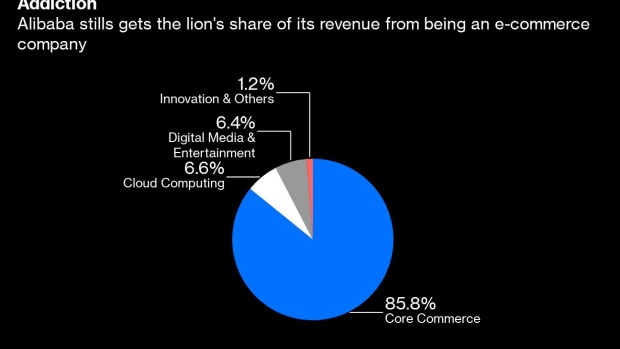Nov 10, 2019
It's Time for Alibaba to Slay the Monster Jack Ma Created
, Bloomberg News

(Bloomberg Opinion) -- Alibaba Group Holding Ltd. should put its Singles’ Day shopping extravaganza out to pasture.
The Nov. 11 annual event, which has been going for a decade, started as a marketing gimmick for an upstart e-commerce company looking to draw a crowd. And it did.
The 24-hour shopping period, during which Alibaba and its vendors offer big discounts while celebrities (Taylor Swift this year) jet in to entertain crowds, is focused on one number: gross merchandise value, a fancy word for turnover, or the amount of money that sloshes through the cyber cash registers of the company’s e-commerce platforms.
GMV grew more than 4,000 times between 2009 and 2018, hitting $30.8 billion last year. But the metric is meaningless. There are ways to juice the figure, and it has almost zero correlation with Alibaba’s revenue or profit. In fact, Alibaba stopped reporting GMV in its quarterly financials two years ago (though it still references growth in the number).
“It doesn’t represent our true identity, and overemphasizing it makes people just think about e-commerce,” founder and then-Chairman Jack Ma said at the 2016 shopping gala. Yet the company went ahead and shouted those numbers from the rooftops the following year. And the year after. “Eye-popping numbers,” Alibaba said of last year’s record.
I suspect this is because without a shiny big new number, the event would lose its luster. That in turn has created a spur to find new ways to inflate the figure, such as taking orders early, avoiding processing refunds on that day, and offering incentives to transact. News that Alibaba is moving ahead with plans to raise as much as $15 billion selling shares in Hong Kong adds further impetus for the company to report a bumper Nov. 11.
It isn’t as though Alibaba invented Singles’ Day. Represented by the 11/11 date, it has been around since at least the early ’90s as a student celebration of single life. Ma and a little-known executive named Daniel Zhang simply commercialized it, similar to the way retailers turned Valentine’s Day into a smorgasbord of cheap chocolates, fluffy toys, and bad dates.
These aren’t the only ridiculous shopping festivals. Black Friday and Cyber Monday are as absurd, but neither is so driven by one company. (Cyber Monday is reportedly the brainchild of a U.S. retail association).
Alibaba doesn’t want to be just an e-commerce company anymore. Zhang, who has risen through the ranks and took over as chairman from Ma two months ago, is hoping to lean more heavily on new businesses such as cloud computing, digital media and entertainment, offline retail, and local services such as deliveries.
But the company cannot move into the post-Jack era if it keeps focusing on GMV. As long as the annual shopping event persists with a singular focus on sales numbers and gimmicky discounts, then the entire company, and its investors, will be stuck with the mindset that Alibaba is merely an e-commerce company.
“If we don’t kill our existing business, someone else will,” Zhang said in an interview with Bloomberg Businessweek in September.
Zhang is right. And he knows what he needs to do.
To contact the author of this story: Tim Culpan at tculpan1@bloomberg.net
To contact the editor responsible for this story: Matthew Brooker at mbrooker1@bloomberg.net
This column does not necessarily reflect the opinion of the editorial board or Bloomberg LP and its owners.
Tim Culpan is a Bloomberg Opinion columnist covering technology. He previously covered technology for Bloomberg News.
©2019 Bloomberg L.P.





